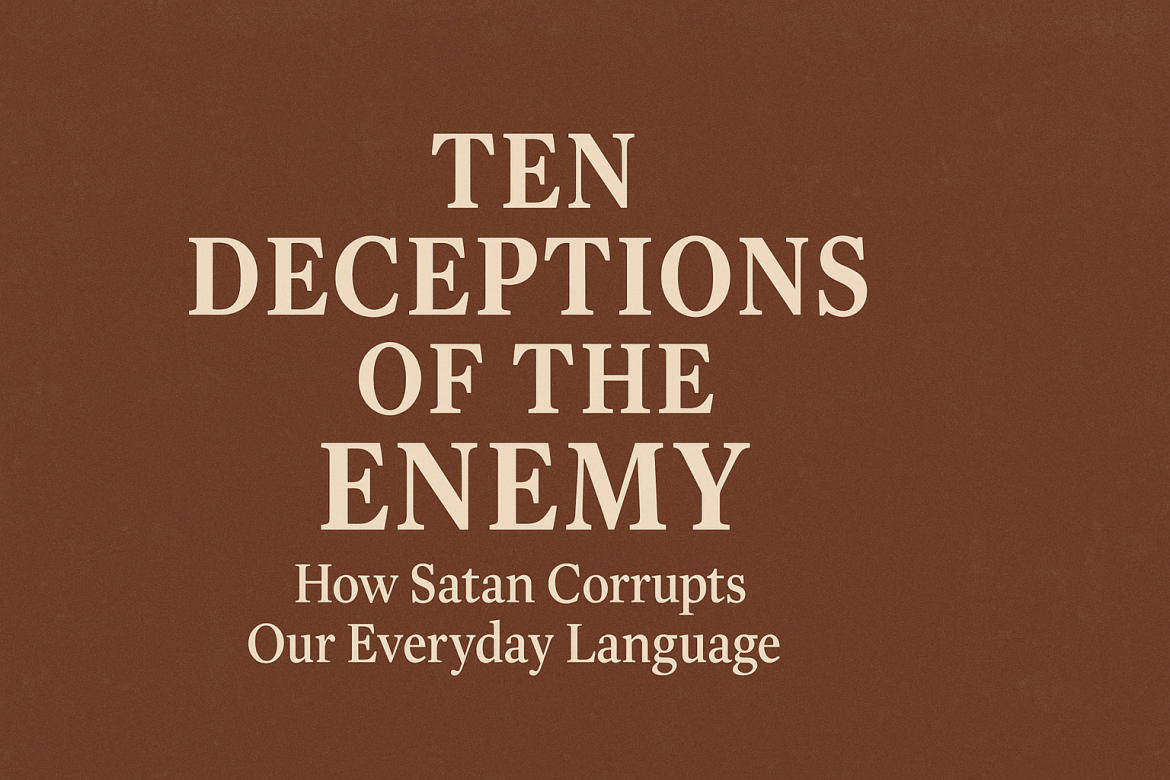Five Things We Will Learn
- How subtle phrases in everyday speech can become open doors for Satan’s influence.
- Why dismissive language like “Who cares?” and “What difference does it make?” erodes moral clarity.
- How “my truth,” victimhood, and deconstructing Scripture work together to undermine biblical authority.
- What Jesus’ temptation in Matthew 4 reveals about when and how the enemy attacks.
- Why Satan’s power is real but limited—and how believers can resist him with confidence.
How the Enemy Slips into Everyday Conversation
The enemy rarely walks into our lives with a pitchfork and a neon sign. He prefers something much more subtle: phrases we repeat, tolerate, and eventually believe.
Satan doesn’t just attack with obvious evil; he corrupts our language so that our words slowly detach us from truth, responsibility, and God. When we begin to talk like the world, we begin to think like the world—and eventually we may live like the world.
Let’s walk through ten common phrases that reveal how the enemy works:
One of Satan’s favorite lies is the quiet whisper: “What I do doesn’t really matter.”
“What I Do Doesn’t Really Matter”
It sounds harmless:
- It doesn’t matter how I eat.
- It doesn’t matter who I associate with.
- It doesn’t matter what I watch, listen to, or allow into my heart.
This lie attacks your God-given agency. Scripture shows us over and over that choices have eternal weight, that obedience matters, and that faith is expressed in action. When you accept “what I do doesn’t matter,” you’re already halfway to spiritual apathy.
Satan’s “great trick” is convincing people he doesn’t exist. If he can get you to treat your choices as meaningless, he’s already leading you away from the reality of a holy God who sees, knows, and cares.
“Who Cares?” and “What Difference Does It Make?”
The enemy also loves the shrug: “Who cares?” and “What difference does it make?”
“Who cares if I save myself for marriage?”
“Who cares if we tell the truth?”
“Who cares if a few lives are lost?”
When we say “Who cares?” we’re really saying, “There is no divine Judge. There is no One in charge. No one is watching.”
We’ve seen that on the public stage. “What difference does it make?” has been used to dismiss the deaths of real people, as if human life were an accounting error instead of an eternal soul. From there it’s a small step to dismissing a million abortions a year, or any other mass evil, as just “the way it is.”
Language like this normalizes moral relativism. When life, purity, and truth no longer “make a difference,” the culture becomes numb—and the Church is tempted to drift along with it.
“We’re All Dead in the Long Run Anyway”
Another lie sounds very philosophical: “We’re all dead in the long run. We don’t live forever.”
For the Christian, that is flatly false. We do live forever. Our choices are not just about this life; they echo into eternity.
Satan uses this phrase to make everything feel pointless:
- If life is short and meaningless, why sacrifice?
- Why obey God when sin seems easier?
- Why endure suffering when pleasure is available right now?
If you are nothing more than a random clump of cells, then sin doesn’t seem that serious. But if you are an eternal soul made in the image of God, then every moment and every decision matters.
“My Truth” and the Worship of Self
Few phrases reveal the spirit of the age like this one: “That’s my truth.”
This isn’t just bad grammar—it’s rebellion dressed up as authenticity.
“Charlie, you don’t know what it’s like to be judged by the color of your skin as a white male.”
In that one sentence, the person judges based on skin color while claiming to oppose judgment based on skin color. That’s the madness of “my truth.”
The enemy loves this language because it mirrors his own rebellion. In Isaiah, Lucifer says five times, “I will…”
- I will ascend.
- I will be like the Most High.
- I will rule.
“My truth” is just “I will” in modern clothes. It says:
- I will define reality.
- I will decide what is male and female.
- I will decide right and wrong.
But your opinion does not become truth just because you feel it intensely. Truth existed before you, and it will continue long after you. As believers, we are not called to defend “our truth”; we are called to submit to God’s truth.
We have tolerated the “my truth” nonsense far too long. It is not compassion to affirm delusion; it is love to call people back to reality as God defines it.
“If I’m Forgiven, Why Not Sin?”
Here’s a lie many young people wrestle with: “If I’m forgiven, why not sin? I can use my ‘get out of jail free’ card later.”
That attitude reveals a heart that may not understand salvation at all.
Salvation is not a spiritual bail bond service. It is a miracle of new birth—transformation and renewal.
- You do not do good things to get saved.
- You do righteous things because you are saved.
When someone uses grace as permission to “ravage the streets” and then “cash in forgiveness” like an insurance policy, it calls into question whether they have truly been born again.
That logic comes straight from the enemy:
“Just keep sinning. You say you’re saved, right? Nothing really matters.”
But genuine salvation produces a new desire to “push goodness into the world,” not a desire to see how far we can stretch God’s patience.
“God Doesn’t Care About Me”
Another favorite whisper of the enemy: “God doesn’t care about you.”
Look at all the suffering. Look at the tragedies. Look at the injustice. “How could a good God allow this?” Satan uses this to shrink God in our eyes and magnify our pain.
When you accept “God doesn’t care,” prayer dries up, hope fades, and the Bible becomes a closed book. Once again, the language is strategic. Change the way you talk about God, and soon you’ll change the way you relate to Him.
Victimhood: Satan’s Favorite Party
Satan loves victims—not because he loves the hurting, but because victimhood is a trap.
He is “the master of your pity party.” When bitterness, envy, and self-pity start swirling, he’s the one organizing the party:
- “I deserve something for how hard my life has been.”
- “I deserve compensation for what was said or done to me.”
- “I deserve something because of my skin color, my story, my pain.”
Instead of living as new creations in Christ, we can become professional victims, demanding that others pay us back for our wounds.
But the gospel says we are victors in Jesus, not permanent victims of the world. We don’t deny sin or injustice; we refuse to build our identity around them. The enemy wants us stuck in blame; Jesus calls us into freedom.
“The Bible Is Outdated” and the Deconstruction Trap
The enemy is the chief architect of deconstruction. He whispers:
- “The Bible is outdated.”
- “It doesn’t apply in the age of the internet.”
- “It was written by old people who didn’t have TikTok, modern medicine, or technology.”
But the truths of Scripture are as true today as the day they were written. They are eternally true.
The tragedy is that even many churches have swallowed the lie. In 1991, a strong majority of American churches believed the Bible was inerrant and perfect. Now, a much smaller percentage believes that. When you stop treating the Bible as the Word of God and treat it as Poor Richard’s Almanac or just another ancient book, everything else collapses:
- Confusion about life and sexuality.
- Confusion about the unborn.
- Confusion about justice.
- Confusion in politics and public life.
Bad politics flows from bad theology. When the Church abandons Scripture, it stops being salt and light and becomes another opinion factory.
Satan hates the Bible—especially Genesis and Revelation. Genesis exposes his devices; Revelation announces his doom. No wonder he relentlessly attacks the authority of the Word.
Related:
“Follow Your Heart” and the Cult of Feelings
Finally, there is the sugary poison: “Follow your heart.”
It sounds sweet. It looks great on a Pinterest board, often next to half of a Bible verse and some vague spiritual quote. But it is not the way of Jesus.
“Follow your heart” says:
- Your feelings are trustworthy.
- Your desires are a good compass.
- Your impulses are a safe guide.
But what happens if someone’s “heart” leans toward violence? Toward adultery? Toward betrayal? Would we excuse it then?
- “He’s following his heart, that’s why he’s abusive.”
- “He’s following his heart, that’s why he’s a serial adulterer.”
We would never accept that. Yet we accept “follow your heart” in other areas—identity, sexuality, and life choices—as if it were holy.
We are not called to follow our hearts; we are called to obey God’s commands. Feelings are real, but they are not lord. Christ is Lord.
Jesus and the Tempter: A Pattern for Our Battles
To really understand the enemy, we have to look at the moment when Jesus confronted him directly: Matthew 4.
Right after His baptism and anointing in Matthew 3—His public “launch”—Jesus is led by the Spirit into the wilderness to be tempted by the devil. That pattern is important:
- First: anointing, calling, affirmation.
- Then: temptation, attack, questioning.
Many believers experience the same rhythm. After a powerful conference, encounter, or breakthrough, they return home and suddenly hear those familiar whispers:
- “What you do doesn’t really matter.”
- “No one cares.”
- “Is the Bible really true?”
Jesus fasts forty days and nights—like Noah’s forty days, Moses’ forty days, Elijah’s fast, Israel’s forty years. Forty is a number of testing and trust. At the end of that time, He is literally starving. That is when Satan comes.
The enemy attacks when we are most vulnerable—physically, emotionally, or spiritually. For some, it’s after a sleepless night or a red-eye flight. For others, it’s when they’re deeply tired of people, disappointed, or alone.
The devil comes in three main ways in Matthew 4:
- Mocking and provocation – “If you are the Son of God, tell these stones to become bread.” He tries to get Jesus to prove Himself on Satan’s terms.
- Twisting Scripture – He quotes the Bible back to Jesus, trying to weaponize the Word for his own agenda.
- Offering power and glory – He shows Jesus all the kingdoms of the world and their splendor and offers them in exchange for worship.
Notice: Jesus never argues that Satan has no authority on earth. He does not say, “You don’t rule anything.” Jesus acknowledges that this world is enemy-occupied territory—but He refuses to bow.
Instead, He answers each temptation with the Word of God and refuses to negotiate.
The Devil Is Loud—but He Is Limited
The enemy will mock, tempt, twist Scripture, and offer you shortcuts to influence and success. He will remind you of past failures. If he can’t use your sin against you like he wanted to against Jesus, he’ll try to provoke you, shame you, or lure you into compromise.
But Matthew 4 gives us a crucial truth:
“Then the devil left Him.”
The devil is not all-powerful. He is not all-present. He is not all-knowing. He is limited. He can be resisted. He can be worn out. There comes a moment when, in Christ, you can say, “Away from me, Satan,” and he must leave.
If you feel harassed, tempted, or oppressed, it will not last forever. When you stand on the Word of God, anchored in the truth of Scripture, and refuse the lies embedded in everyday phrases, you are standing where Jesus stood—in victory.




